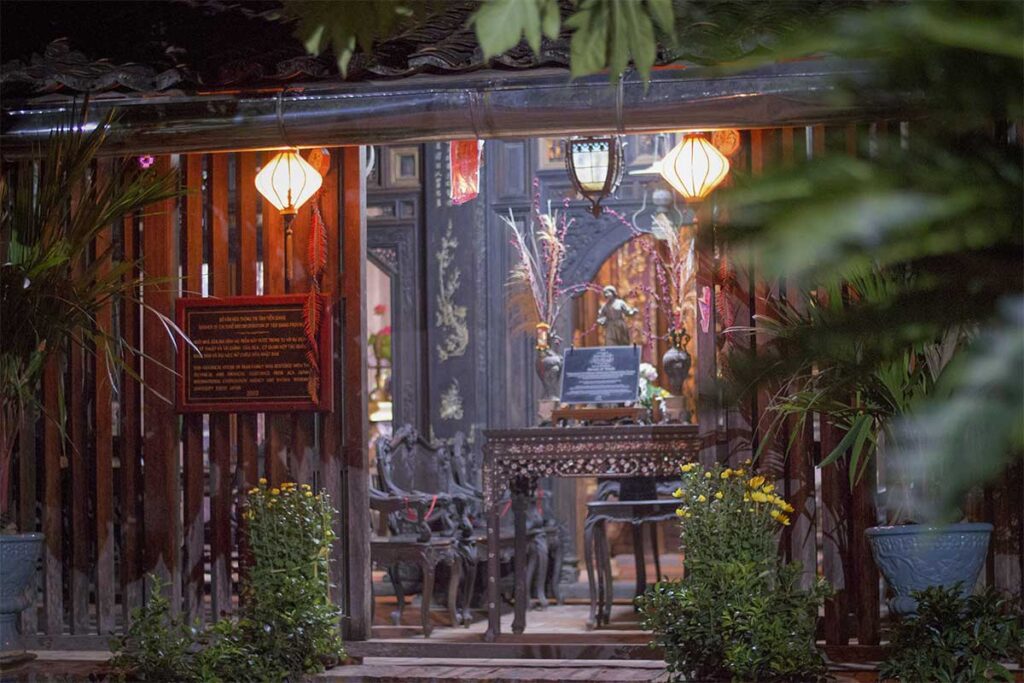History & Background
Ong Kiet’s Ancient House was built in 1838 during the Nguyen dynasty, at a time when wealthy landowners in the Mekong Delta constructed elaborate residences to display their status. The family who owned it made their fortune from trade and farming, and the house reflects the prosperity of the southern elite of that era.
The house is part of Dong Hoa Hiep ancient village in Cai Be, an area known for its cluster of historic residences. Among them, Ong Kiet’s home stands out as one of the most intact examples of traditional architecture, combining ornate woodwork with the open layout typical of the delta’s climate and lifestyle.
By the early 2000s, the building had deteriorated significantly, and a Japanese restoration project (JICA) spent over a year carefully repairing it. The work was supervised by a Japanese architect to ensure accuracy, and the result earned the house recognition from UNESCO’s Asia-Pacific Heritage program.
Today, it remains in the hands of the Tran Tuan Kiet family, who continue to preserve antiques and heirlooms inside. Walking through the rooms gives a sense of how affluent families once lived in the Mekong Delta, with a mix of Vietnamese and Chinese decorative styles and a collection of ceramics, furniture, and artifacts passed down through generations.
Highlights & Architecture of Ong Kiet’s Ancient House
1. Exterior & Garden
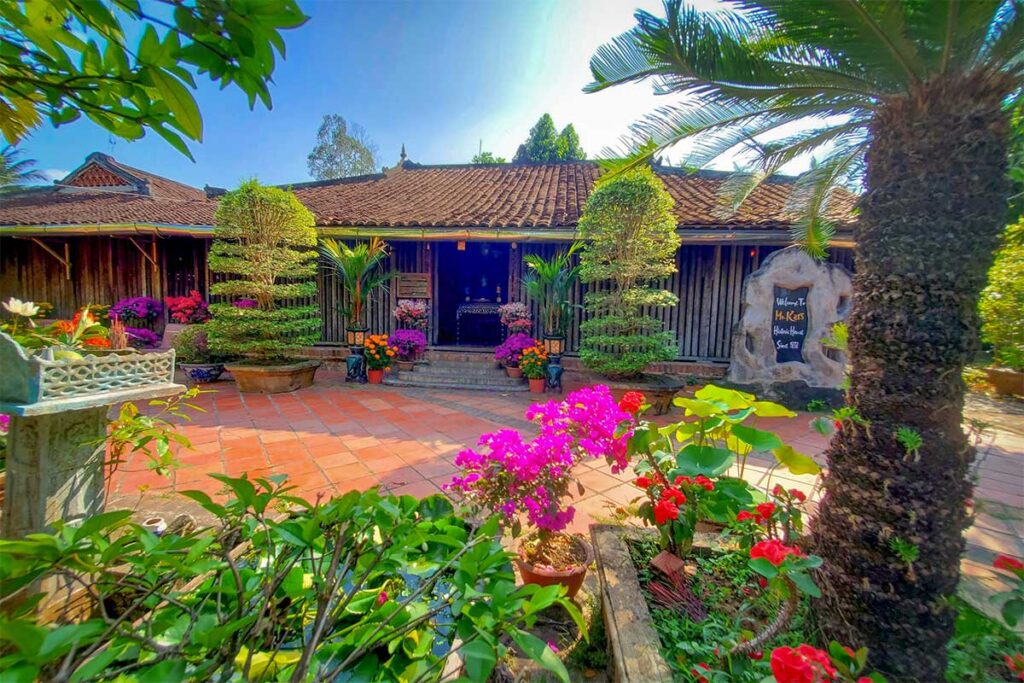
The house sits in the middle of a lush 1.8-hectare orchard, where jackfruit, citrus, and grapefruit trees grow in abundance. A large front yard with stone tables and hammocks under the shade makes the entrance feel relaxed and welcoming. The original gate has been preserved, adding a touch of authenticity to the garden, and the shaded resting spots are a pleasant place to pause before entering the house.
2. Structure & Layout
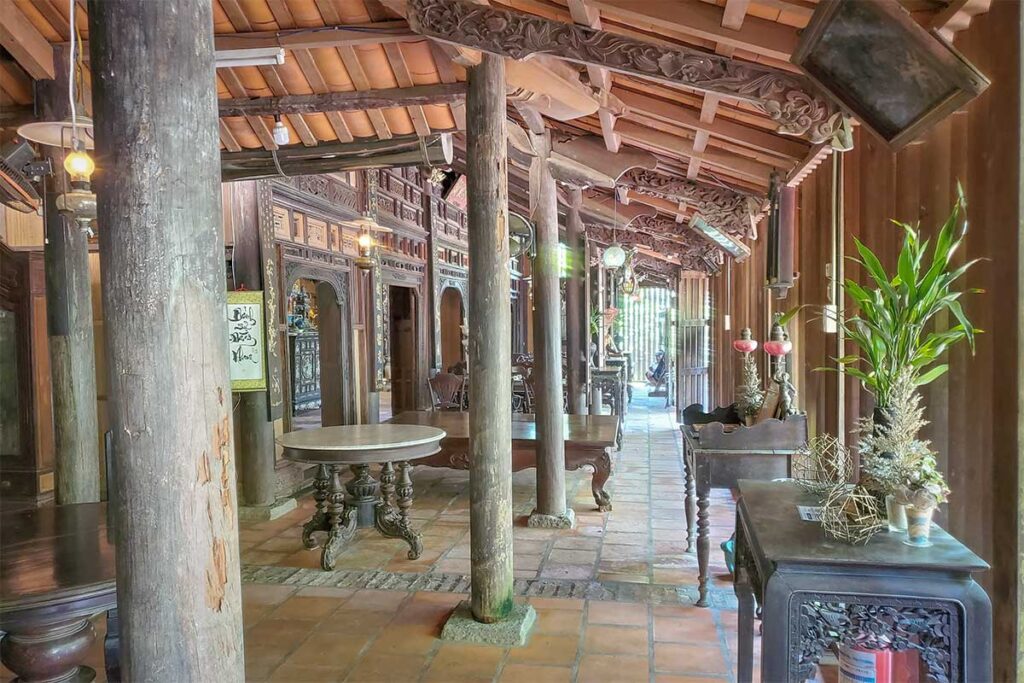
Covering nearly 1,000 square meters, Ong Kiet’s Ancient House is impressive in scale for a rural residence. It follows a traditional design with three main compartments and two side wings, supported by 108 solid wooden pillars made of rare hardwoods such as rosewood and ironwood. The roof is covered with yin-yang tiles—rows placed alternately facing up and down—while the truss system uses an overlapping beam structure typical of 19th-century southern houses.
3. Carvings & Decorative Elements
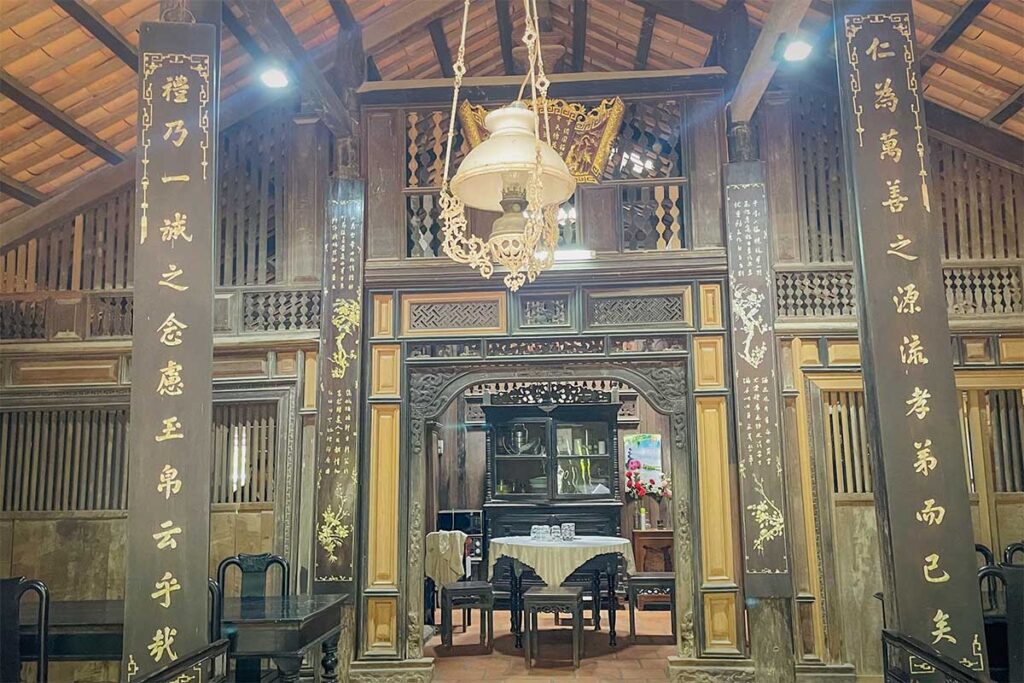
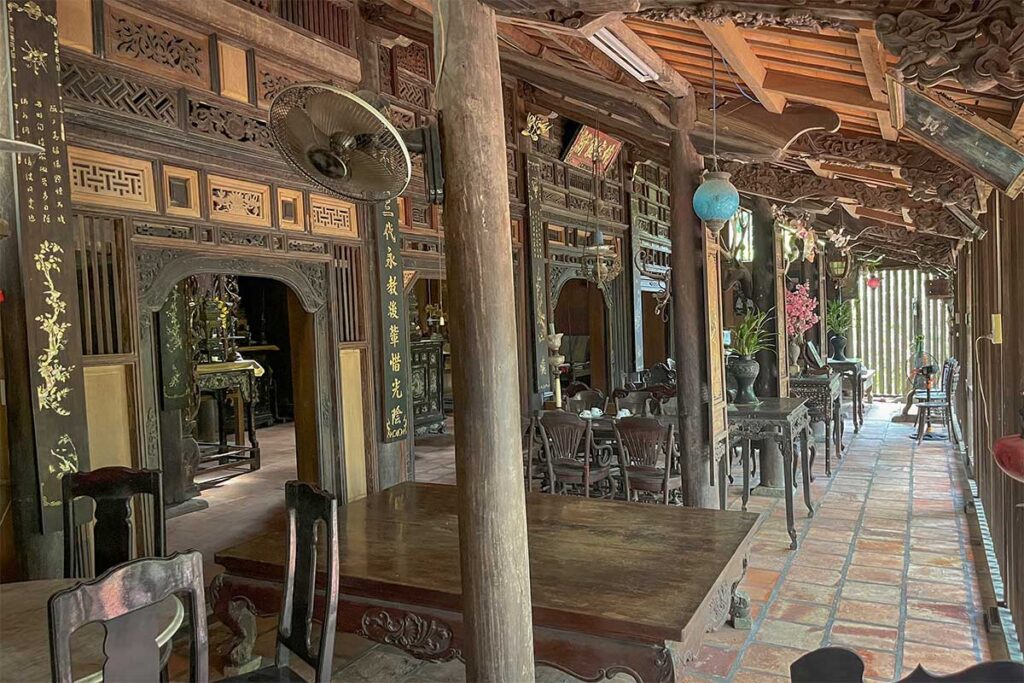
Much of the house’s character comes from its fine craftsmanship. Wooden panels are carved with delicate motifs of bamboo, orchids, plum blossoms, and chrysanthemums—symbols of prosperity and longevity. Many of the panels and furniture pieces are inlaid with mother-of-pearl, while some details are gilded, creating a balance between elegance and restraint. These features show both the artistic taste of the original owners and the skill of craftsmen of the time.
4. Interior & Antiques
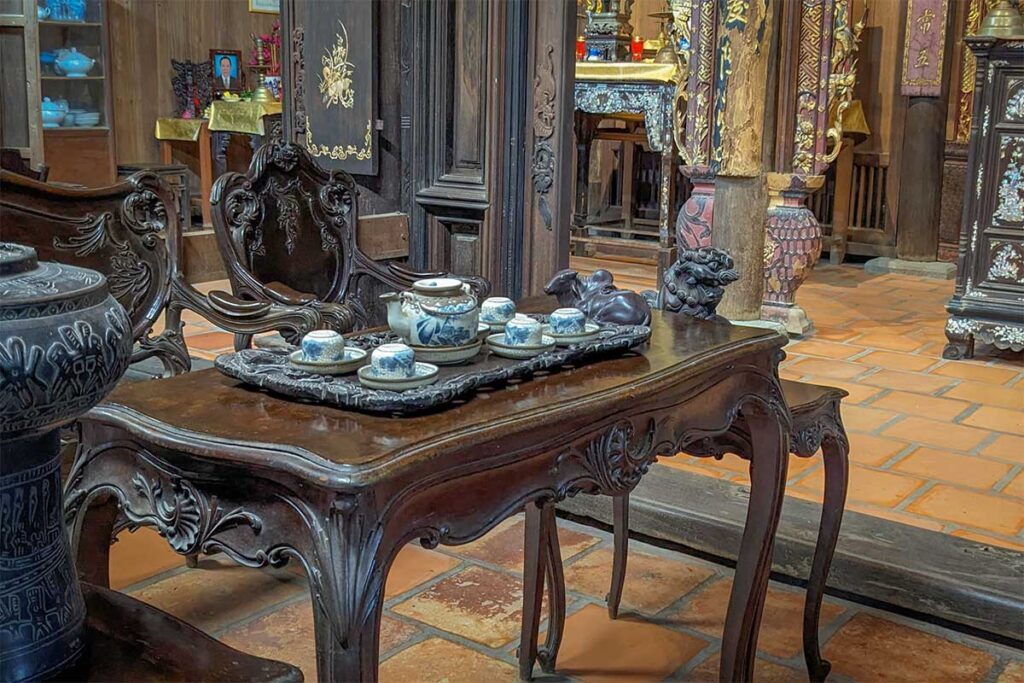
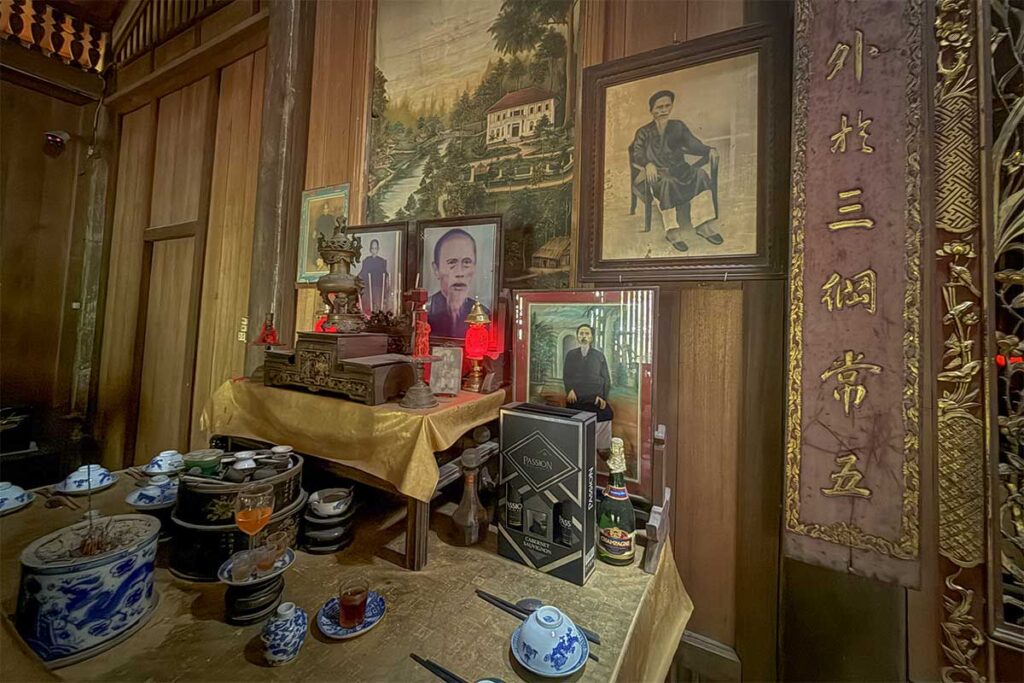
Inside, the house feels like a mix between a family home and a small museum. Oil lamps, chandeliers, and old tea sets sit alongside heavy rosewood and ironwood furniture polished dark with age. The floor is paved with roughly fired square tiles, simple yet in harmony with the wooden structure. Antique ceramics and decorative objects collected by the family over generations are displayed throughout, offering insight into the lifestyle of a wealthy Mekong Delta household.
5. Atmosphere & Experience
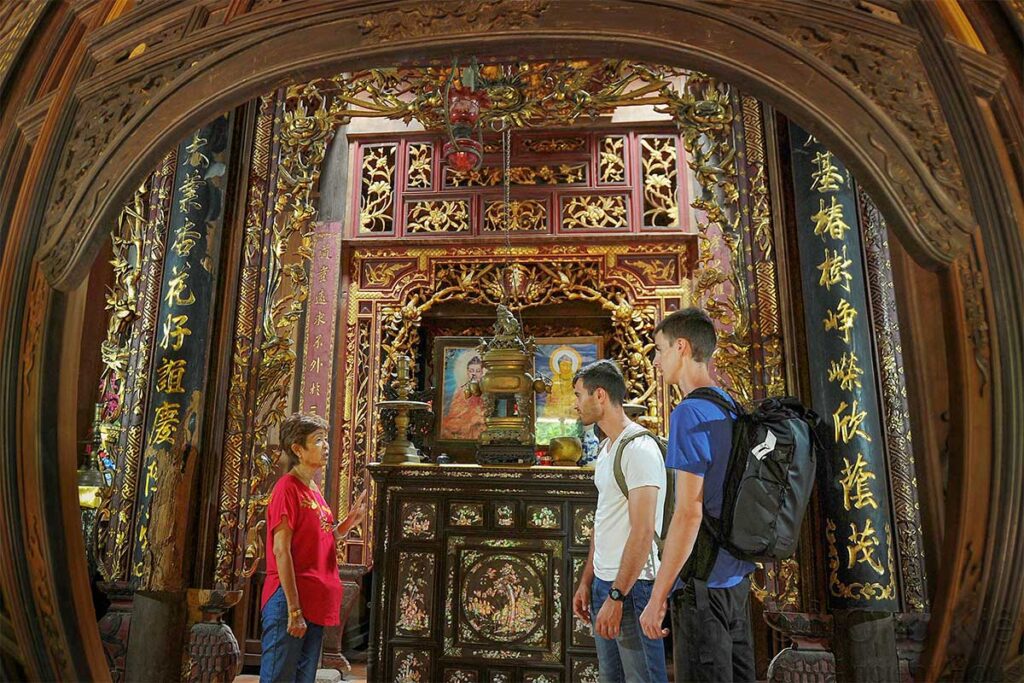
Stepping inside feels both grand and personal. The carved beams and polished furniture reflect aristocratic elegance, but the orchard and open-air layout keep it rooted in the Mekong’s rural setting. It is not a sterile museum—this is still a lived-in family house—so visitors may catch glimpses of everyday life alongside the heritage. That balance of preservation and authenticity is part of what makes Ong Kiet’s Ancient House a memorable stop.
Activities & Facilities
Restaurant & Cuisine
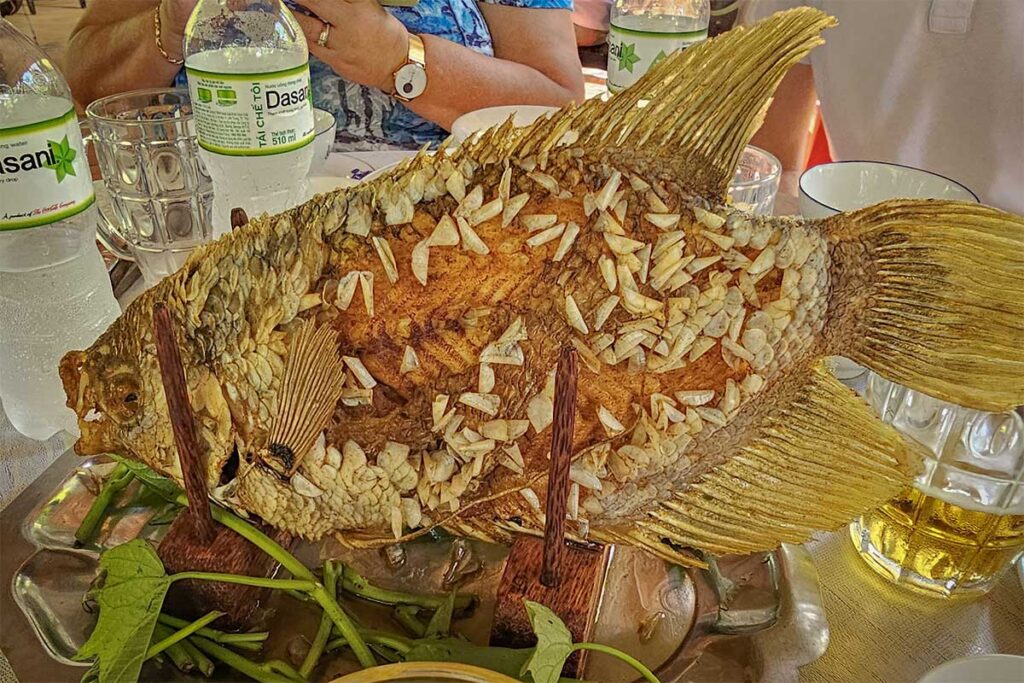
Many visitors come for the food as much as the architecture. The restaurant serves Mekong Delta specialties, with the fried elephant ear fish as the most famous dish. Meals are often arranged as set menus for tour groups, giving a taste of several regional dishes at once. Homestay guests may enjoy a more personal family meal with seasonal produce from the orchard. Prices are higher than a local street restaurant but reasonable for the setting and quality.
Homestay Experience
Ong Kiet’s Ancient House also operates as a small homestay, allowing travelers to spend the night in one of Vietnam’s oldest surviving residences. The rooms are simple but authentic, with traditional furnishings and a family-style setup. Staying here is less about comfort and more about the chance to live inside a piece of heritage, sharing space with the host family and experiencing rural Mekong hospitality.
Cooking Class
For travelers interested in food, cooking classes can be arranged. These focus on Tien Giang specialties, teaching guests how to prepare traditional dishes before sitting down to enjoy the results. It’s a relaxed and interactive way to connect the visit to the house with the flavors of the region.
Cultural Experiences
The house sometimes hosts performances of Đờn ca tài tử, a form of southern folk music recognized by UNESCO as intangible heritage. While not guaranteed every visit, these small performances—combined with the chance to chat with the hosts—add a cultural dimension beyond the architecture and food.
Nearby & Linked activities
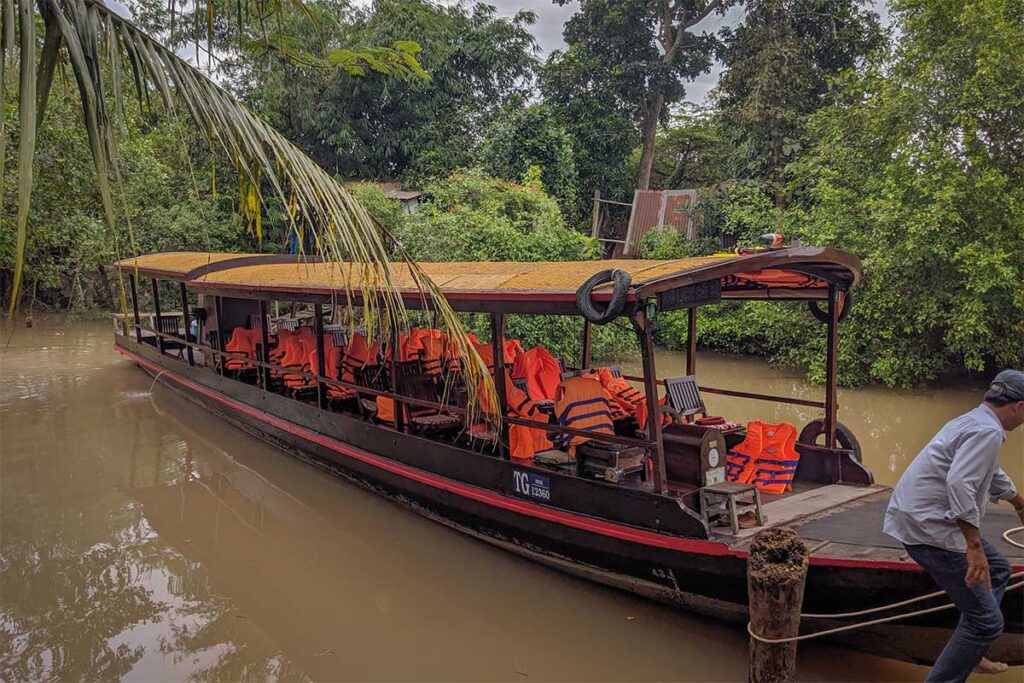
A visit to Ong Kiet’s house is often combined with exploring Cai Be. Popular options include boat tours to Cai Be floating market and the small canals around the town, or cycling through fruit orchards and narrow paths in the countryside. Nearby workshops, such as coconut candy making or rice popcorn production, round out the experience and give a fuller picture of Mekong Delta life.
How to get there
Where is Ong Kiet’s Ancient House?
Ong Kiet’s Ancient House is located in Phu Hoa Hamlet, Dong Hoa Hiep Village, Cai Be District, Tien Giang Province. Cai Be is a riverside town in the Mekong Delta, about two hours by car from Ho Chi Minh City. The house sits within a network of small canals and orchards, so it can be reached by road, bicycle, or boat depending on your travel style.
By Boat
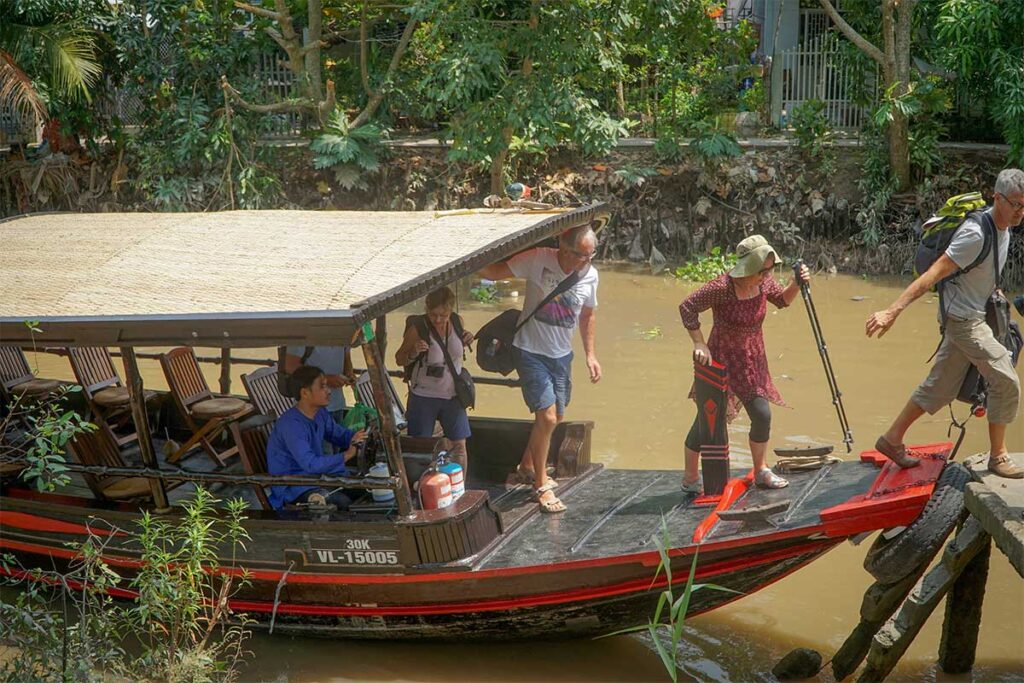
The most atmospheric way to visit is by boat, often combined with a Cai Be floating market tour. Boats dock at a small pier near the house, followed by a short walk through the village paths to reach the entrance. This option gives you a first impression of the delta’s waterways before exploring the house itself.
By Bicycle
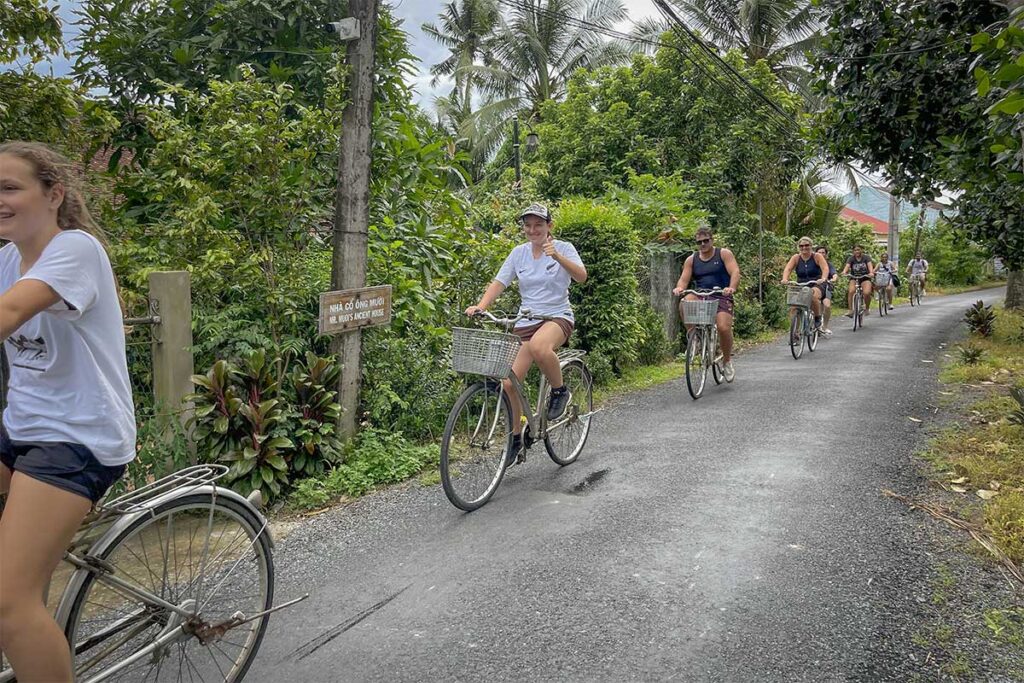
Cai Be’s flat countryside makes cycling an enjoyable option. From the town center, it’s an easy ride through fruit orchards and along narrow village roads. It’s best for travelers staying overnight in Cai Be or nearby homestays, as it offers a slow and scenic way to explore the area.
By Car / Private Driver
If you prefer a straightforward journey, traveling by car is the most practical choice. From Ho Chi Minh City, you can drive directly to Cai Be in about two hours and include the house in a day trip. Within Cai Be, a short car ride also brings you to the site. Since taxis may not always be available for the return trip, it’s better to hire a driver for the day or book the visit as part of an organized itinerary.
Practical visiting information & Tips
Opening hours & Fees
The house is generally open to visitors from 8:00 AM to 5:00 PM. There is no fixed entrance ticket, but costs apply if you join for a meal, cooking class, or homestay. If you come with a tour, the fee is usually included in the package.
Duration of visit
Expect to spend about one hour if you are only walking through the house and gardens. If you stay for lunch, take part in a cooking class, or overnight at the homestay, plan for a half day or longer.
Best time to visit
Visiting in the morning or around midday works best, especially if you want to combine the house with a meal. Lunchtime can get crowded with tour groups, so come earlier or later if you prefer a quieter atmosphere. For cycling or boat trips around Cai Be, the dry season (December–April) is the most comfortable, though the house itself is accessible year-round.
Things to Keep in Mind
- Language: English is spoken only at a basic level, so having a translation app can help.
- Private home: The house is still lived in, so respect closed or private areas.
- Climate: It can feel warm inside as there is no air-conditioning; light clothing and water are recommended.
- Meals: Portions at set lunches are generous, often more than needed, especially for small groups.
Is Ong Kiet’s Ancient House worth visiting?
Ong Kiet’s Ancient House is worth visiting if you’re interested in architecture, history, and cultural immersion. The carved woodwork, antiques, and orchard setting make it a unique stop that adds depth to a trip through the Mekong Delta. Pairing the visit with a meal or overnight homestay gives you more than just a walk-through—it becomes a cultural experience.
It might feel less appealing if you expect a grand palace-style landmark or if you dislike places that attract tour groups at lunchtime. The house is impressive in its own way, but it’s not a monumental sight—rather, it’s a glimpse into a wealthy southern family’s life nearly two centuries ago.
For most travelers, Ong Kiet’s Ancient House works best as part of a Cai Be day trip or an overnight stay in the Mekong Delta. On its own, it may feel small, but when combined with a boat tour, cycling, or visits to nearby villages, it becomes a rewarding stop on a broader journey.
